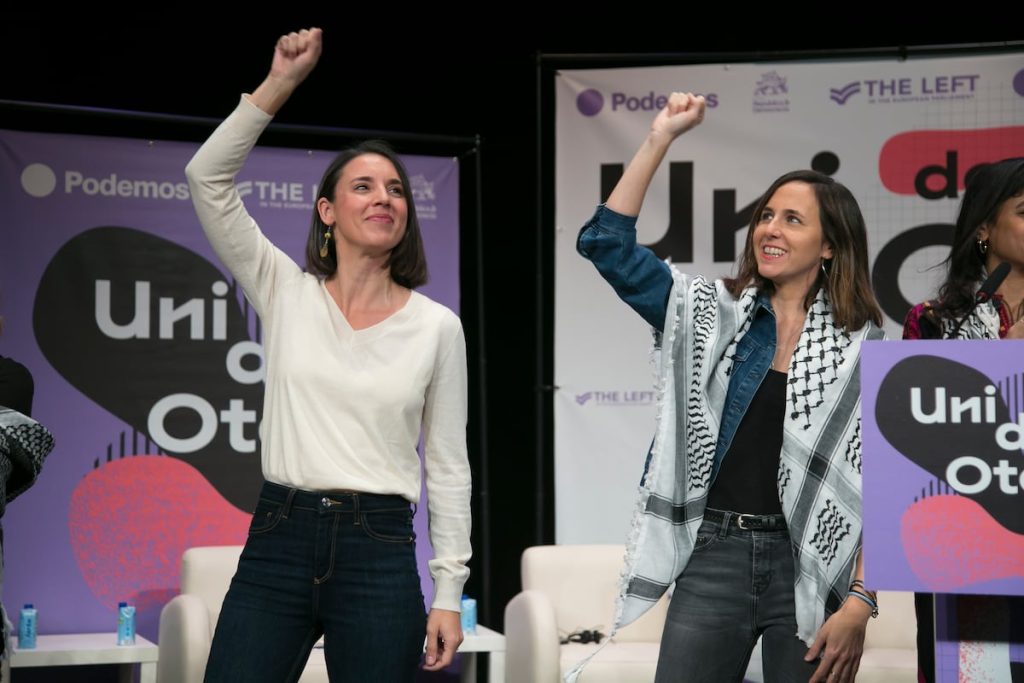Attempting to distance themselves from the PSOE, especially in the government’s handling of the housing problem, Podemos made a clear demonstration on Saturday that they are not willing to let themselves be overshadowed by the remaining ground they have as a strong and resilient left. The central event of their Autumn University, “Change everything we cannot accept,” was a succession of messages against the PSOE, constantly equating them to the PP, particularly on the issue of the “genocide” they accuse Israel of. The party’s secretary general, Ione Belarra, issued a direct warning to the government of Pedro Sánchez. She stated that if they want Podemos’ support, they must “end commercial relations” with Israel, “lower rents by law, and put an end to speculation” in housing, another key topic of the morning. Belarra set the bar for the government to gain the support of the four Podemos deputies just as negotiations for the approval the 2024 budget approach.
There was no mention of the left-wing unity that Antonio Maíllo, leader of IU, would defend the following Sunday. The successive speakers at the Autumn University rally blatantly ignored Sumar, focusing instead on direct confrontation with the PSOE, interjected with a warning about their conditions for supporting the government, which aligns with what Pablo Iglesias had outlined earlier in the week. Despite the silence on Sumar, the speeches hinted at a disdainful criticism of the main left-wing group, especially when they emphasized that Sánchez is currently governing “alone,” according to Belarra. In contrast to the current government, Belarra presents Podemos as “the voice of resistance and dignity” and claims they are “very alone in Congress,” implying that Sumar is simply an appendage of the PSOE without its own identity.
The recurring idea in all the speeches was that Podemos is a party that has been crushed by “lawfare” and media manipulation but has managed to survive. Despite their reduced representation with only four deputies and minimal presence in regions, their leaders are sending a message to their supporters that they are willing to continue fighting. Montero equated the PP and the PSOE, accusing them of multiple similarities, emphasizing the divergent political paths they are now on. Montero assigns the role of “accomplices of the genocidal” to both parties, stating that they both prioritize defending rentiers, voted for a “racist and miserable” migration and asylum pact in Europe, and cater to powerful investment funds and reactionary interests.
Montero asserts that the “established power” aims to bring back bipartisanship to silence Podemos’ legacy and voice. The speakers did not engage in self-criticism about the party’s significant electoral setback, opting instead to celebrate surviving and maintaining visibility thanks to key figures like Irene Montero. With their upcoming internal renewal process, Podemos plans to elect new executive boards in several regions and postpone their Fifth Citizen Assembly until June of next year to select the next Secretary General, currently held by Ione Belarra, who shares the spotlight with Montero and Pablo Iglesias.
The event also served as a platform for Podemos to reaffirm their international alliances, with guest speakers such as Jeremy Corbyn, Rima Hassan from La France Insoumise, and Catarina Martins from Bloco de Esquerda. Podemos’ forceful message was evident throughout the event, echoing their commitment to progressive values and convictions. Additionally, Sumar also expressed their demands, insisting on reforming the tax system to ensure justice and fiscal responsibility, emphasizing the importance of taxing the wealthy and oligopolies to fund social progress and economic growth. Their insistence on maintaining and reinforcing taxes on banks and energy companies depicted a firm stance on ensuring fiscal equality and progressive policies.















